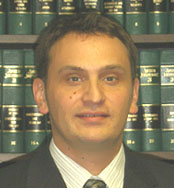

| THE SAINT PAUL PERSONAL INJURY ATTORNEY |
 |
 |
|
APPELLATE PROCEDURE - Columbus Day legal holiday for computing end of appeal timeSTATE OF MINNESOTAIN SUPREME COURT A05-2014 Court of Appeals Anderson, Russell A., C.J. Commandeur LLC, et al., Appellants, vs. Filed: December 7, 2006 Office of Appellate Courts Howard Hartry, Inc., Respondent. S Y L L A B U S Columbus Day is a legal holiday under Minn. R. Civ. P. 6.01 and thus is not included in computing the last day of an appeal period. Reversed and remanded; appeal reinstated. Considered and decided by the court en banc without oral argument. O P I N I O N ANDERSON, Russell A., Chief Justice. In this case, we consider whether the court of appeals properly dismissed an appeal as untimely under the Rules of Civil Appellate Procedure, which extend an appeal period when the last day of the period falls on a legal holiday. The narrow issue before us is whether Columbus Day is a legal holiday for purposes of computing the last day of an appeal period. We conclude that it is and reverse the order of the court of appeals dismissing the appeal. We recite only those facts necessary to decide the narrow issue before us. The district court granted summary judgment dismissing the claims of Commandeur LLC and ACRO Business Finance Corp. (appellants) against Howard Hartry, Inc. (respondent), and judgment was entered on August 10, 2005. Generally, an appeal may be taken within 60 days after entry of judgment. Minn. R. Civ. App. P. 104.01. The method for computing the 60-day period is specified in Minn. R. Civ. P. 6.01, subd. 1. See Minn. R. Civ. App. P. 126.01. Rule 6.01 provides that the last day of the period is included in the computation, unless “it is a Saturday, a Sunday, or a legal holiday, * * * in which event the period runs until the end of the next day which is not a [sic] one of the aforementioned days.” Excluding the day judgment was entered, as prescribed by Rule 6.01, the sixtieth day of the appeal period in this case fell on Sunday, October 9, 2005. The following day, October 10, was Columbus Day. Appellants filed and served their notice of appeal on Tuesday, October 11. The court of appeals dismissed the appeal as untimely, concluding that “Columbus Day is not a holiday for the appellate courts” and therefore “the appeal period expired on October 10.” We are called upon in this case to interpret the term “legal holiday” in Minn. R. Civ. P. 6.01. We interpret our court rules de novo. Huntsman v. Huntsman, 633 N.W.2d 852, 854 (Minn. 2001). We also review jurisdictional questions de novo. Rubey v. Vannett, 714 N.W.2d 417, 421 (Minn. 2006). “In construing procedural rules, we first look to the plain language of the rule and its purpose.” Id. Under Rule 6.01, “‘legal holiday’ includes any holiday defined or designated by statute.” This language was intended “to define explicitly what constitutes a ‘legal holiday.’” Minn. R. Civ. P. 6.01 advisory comm. cmt.—1996 amendments. Minnesota Statutes § 645.44, subd. 5 (2004), defines the term “holiday.” Unlike other holidays, the treatment of Columbus Day varies under the statute. Although section 645.44, subd. 5, generally defines “holiday” to include Columbus Day, the statute also provides that Columbus Day is not a holiday for the executive branch, and that other branches of state government have the option of determining whether Columbus Day is a holiday: “Holiday” includes * * * Christopher Columbus Day, the second Monday in October * * *. No public business shall be transacted on any holiday, except in cases of necessity and except in cases of public business transacted by the legislature, nor shall any civil process be served thereon. However, for the executive branch of the state of Minnesota, “holiday” also includes the Friday after Thanksgiving but does not include Christopher Columbus Day. Other branches of state government and political subdivisions shall have the option of determining whether Christopher Columbus Day and the Friday after Thanksgiving shall be holidays. Where it is determined that Columbus Day or the Friday after Thanksgiving is not a holiday, public business may be conducted thereon. Minn. Stat. § 645.44, subd. 5 (emphasis added). Respondent argues that Columbus Day is not a legal holiday under Rule 6.01 because Minn. Stat. § 654.44, subd. 5, “plainly defines Columbus Day as an optional holiday” for the judicial branch, and the judicial branch does not recognize Columbus Day as a holiday. In support, respondent cites the advisory committee comments to Rule 6.01, which suggest that whichever day the judicial branch selects as a holiday—Columbus Day or the Friday after Thanksgiving—“is defined to be a holiday under the rule.” Minn. R. Civ. P. 6.01 advisory comm. cmt.—1996 amendments. Appellants argue that the court of appeals’ conclusion that Columbus Day is not a legal holiday under Rule 6.01 leads to an unjust and unfair result “that is certain to cause other parties to lose their rights without notice.” According to appellants, litigants “should be able to rely on the plain language of the Rules,” and “Rule 6.01 does not define a ‘legal holiday’ as ‘any court holiday.’” Procedural rules are “construed and administered to secure the just, speedy, and inexpensive determination of every action,” Minn. R. Civ. P. 1, and “should be given liberal construction so as to effectuate that purpose,” Huntsman, 633 N.W.2d at 854. “Limitations on time to appeal are designed to expedite the final resolution of litigation, with due consideration to fairness and certainty of procedure.” E.C.I. Corp. v. G.G.C. Co., 306 Minn. 433, 435, 237 N.W.2d 627, 629 (1976). For reasons of fairness and certainty, we hold that Columbus Day is a legal holiday under Minn. R. Civ. P. 6.01. Our holding is consistent with the broad language of the rule, which defines “legal holiday” as “any holiday defined or designated by statute.” Minn. R. Civ. P. 6.01 (emphasis added). Columbus Day is included in the general definition of a holiday in Minn. Stat. § 654.44, subd. 5. It is not readily apparent from the language of the rule that legal holiday means only those holidays recognized by the judicial branch. Compare Minn. R. Civ. P. 6.01 with Minn. Gen. R. Prac. 503(c) (stating that “legal holiday” under the Conciliation Court Rules includes “all state level judicial branch holidays established pursuant to law”) (emphasis added). Therefore, we reject a narrow interpretation of legal holiday that may, as appellants contend, set “a trap for the unwary.” Our holding that Columbus Day is a legal holiday also fosters certainty because the definition of legal holiday in Rule 6.01 does not depend on whether the judicial branch recognizes Columbus Day as a holiday. Our holding is at odds with the advisory committee comments to Rule 6.01; however, as we have noted, advisory “committee comments are included for convenience and are not binding on the court.” Vandenheuvel v. Wagner, 690 N.W.2d 753, 756 (Minn. 2005); accord Borchert v. Maloney, 581 N.W.2d 838, 840 & n.9 (Minn. 1998). In addition, although our other court rules are not completely uniform, almost all encompass Columbus Day in their definition of legal holiday. Our holding that Columbus Day is a legal holiday under Rule 6.01 is also consistent with the federal treatment of Columbus Day. One of the purposes of the language in Rule 6.01 defining legal holiday was to “conform[] the rule to its federal counterpart.” Minn. R. Civ. P. 6.01 advisory comm. cmt.—1996 amendments. Columbus Day is a federal holiday, and the Federal Rules of Civil Procedure expressly designate Columbus Day as a “legal holiday.” Fed. R. Civ. P. 6(a). Moreover, a party appealing a judgment is permitted to file and serve a notice of appeal by mail, Minn. R. Civ. App. P. 125, but there is no mail service on Columbus Day. Litigants may be confused about the proper time for service by mail if Columbus Day is included in computing the last day of an appeal period. See Minn. R. Civ. App. P. 125.01 (stating that an appeal is timely if “the papers are deposited in the mail within the time fixed for filing”); Minn. R. Civ. App. P. 125.03 (stating that “[s]ervice by mail is complete on mailing”). “As every practitioner is keenly aware, the importance of an accurate calculation of time allowed for appeal is critical and an error can be fatal to further review.” State v. Hugger, 640 N.W.2d 619, 625 (Minn. 2002). The Rules of Civil Procedure “reflect a preference that actions be determined on the merits,” Patterson v. Wu Family Corp., 608 N.W.2d 863, 867 (Minn. 2000), and “the rules are to be liberally construed so as to serve the interests of justice,” Larson v. Indep. Sch. Dist. No. 314, 305 Minn. 358, 362, 233 N.W.2d 744, 747 (1975). Accordingly, we grant appellants the benefit of the doubt in their efforts to comply with the time restrictions set forth in the rule. Because Columbus Day is a legal holiday under Minn. R. Civ. P. 6.01 and thus is not included in computing the last day of the 60-day appeal period, we conclude that appellants’ notice of appeal was timely through Tuesday, October 11, 2005, the day on which appellants filed and served their notice of appeal. Therefore, we reverse the decision of the court of appeals dismissing the appeal and remand to the court of appeals for consideration of the appeal on the merits. Reversed and remanded; appeal reinstated. |
|||||||||||||||||||||||||||||||||||||||||||||||||||||||||||||||||||||||
| By visiting this page or clicking the "submit" button above, you agree that you have read and accept this "disclaimer". |
||||||||||||||||||||||||||||||||||||||||||||||||||||||||||||||||||||||||
| Copyright ©
Michael E. Douglas, Attorney at Law, Saint Paul MN. All Rights
Reserved. Minnesota Lawyer representing Personal Injury, Car / Auto Accident, Workers Compensation, Medical Malpractice, Social Security Disability claims. Dedicated to Injured Workers, Victims of Negligence, Car Accidents, Victims of Fraud, and those in need of legal assistance. |